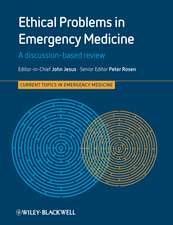Monstrous Crimes and the Failure of Forensic Psychiatry: International Library of Ethics, Law, and the New Medicine, cartea 53
Autor John Douard, Pamela D. Schultzen Limba Engleză Hardback – 13 noi 2012
This book is the first to address the connections between the history of the monster metaphor, the 19th century idea of the criminal as monster, and the 20th century conception of the psychopath: the new monster. The book addresses, in particular, the ways in which the metaphor is used to scapegoat certain categories of crimes and criminals for anxieties about our own potential for deviant, and, indeed, dangerous interests. These interests have long been found to be associated with the fascination people have for monsters in most cultures, including the West.
The book outlines an alternative public health approach to sex offending, and crime in general, that can incorporate what we know about illness prevention while protecting the rights, and humanity, of offenders.
The book concludes with an analysis of the role of forensic psychiatrists and psychologists in representing criminal defendants as psychopaths, or persons with certain personality disorders. As psychiatry and psychology have transformed bad behavior into mad behavior, these institutions have taken on the legal role of helping to sort out the most dangerous among us for preventive "treatment" rather than carceral "punishment."
| Toate formatele și edițiile | Preț | Express |
|---|---|---|
| Paperback (1) | 995.17 lei 43-57 zile | |
| SPRINGER NETHERLANDS – 14 dec 2014 | 995.17 lei 43-57 zile | |
| Hardback (1) | 1159.91 lei 43-57 zile | |
| SPRINGER NETHERLANDS – 13 noi 2012 | 1159.91 lei 43-57 zile |
Din seria International Library of Ethics, Law, and the New Medicine
- 5%
 Preț: 347.29 lei
Preț: 347.29 lei -
 Preț: 397.25 lei
Preț: 397.25 lei - 15%
 Preț: 635.31 lei
Preț: 635.31 lei - 18%
 Preț: 942.76 lei
Preț: 942.76 lei - 5%
 Preț: 718.65 lei
Preț: 718.65 lei - 15%
 Preț: 634.68 lei
Preț: 634.68 lei - 15%
 Preț: 637.78 lei
Preț: 637.78 lei -
 Preț: 380.07 lei
Preț: 380.07 lei - 18%
 Preț: 959.98 lei
Preț: 959.98 lei - 15%
 Preț: 641.20 lei
Preț: 641.20 lei - 18%
 Preț: 944.19 lei
Preț: 944.19 lei - 15%
 Preț: 636.80 lei
Preț: 636.80 lei - 15%
 Preț: 643.00 lei
Preț: 643.00 lei - 18%
 Preț: 952.89 lei
Preț: 952.89 lei - 15%
 Preț: 643.48 lei
Preț: 643.48 lei - 18%
 Preț: 954.45 lei
Preț: 954.45 lei - 5%
 Preț: 1095.73 lei
Preț: 1095.73 lei - 15%
 Preț: 645.79 lei
Preț: 645.79 lei - 18%
 Preț: 1111.22 lei
Preț: 1111.22 lei - 15%
 Preț: 643.84 lei
Preț: 643.84 lei - 18%
 Preț: 1227.67 lei
Preț: 1227.67 lei - 18%
 Preț: 953.65 lei
Preț: 953.65 lei - 15%
 Preț: 638.57 lei
Preț: 638.57 lei - 5%
 Preț: 1101.21 lei
Preț: 1101.21 lei
Preț: 1159.91 lei
Preț vechi: 1220.96 lei
-5% Nou
Puncte Express: 1740
Preț estimativ în valută:
221.95€ • 232.32$ • 184.73£
221.95€ • 232.32$ • 184.73£
Carte tipărită la comandă
Livrare economică 31 martie-14 aprilie
Preluare comenzi: 021 569.72.76
Specificații
ISBN-13: 9789400752788
ISBN-10: 9400752784
Pagini: 216
Ilustrații: XVI, 200 p.
Dimensiuni: 155 x 235 x 20 mm
Greutate: 0.48 kg
Ediția:2013
Editura: SPRINGER NETHERLANDS
Colecția Springer
Seria International Library of Ethics, Law, and the New Medicine
Locul publicării:Dordrecht, Netherlands
ISBN-10: 9400752784
Pagini: 216
Ilustrații: XVI, 200 p.
Dimensiuni: 155 x 235 x 20 mm
Greutate: 0.48 kg
Ediția:2013
Editura: SPRINGER NETHERLANDS
Colecția Springer
Seria International Library of Ethics, Law, and the New Medicine
Locul publicării:Dordrecht, Netherlands
Public țintă
ResearchCuprins
- Introduction: Framing Criminals as Monstrous Deviants.
- From the Carceral State to the Preventive State.
- Monsters: A Cultural History.
- The social construction of moral panic.
- The Rhetorical Challenge: Countering Moral Panic.
- The Psychopath I: The New Monster Among Us.
- The Psychopath II: The Monster Within.
- The Psychopath III: A Convenient Scapegoat.
- Scientific Objectivity in the 21st Century.
- Conclusion: The Ethics of Forensic Mental Heath Expertise.
Recenzii
From the reviews:
“The intended audience includes those interested in medicine and psychology and the application of information from these fields to forensic settings. … valuable for those directly engaged in clinical assessment of sex offenders in reviewing the issues and attitudes of society toward, and the ethical issues of, assessing for civil commitment of sex offenders. … Monstrous Crimes and the Failure of Forensic Psychiatry brings attention to how we treat sex offenders in our society.” (Juanita N. Baker and Vanessa A. Edkins, PsycCRITIQUES, Vol. 58 (45), November, 2013)
“This work is designed to stimulate discussion and offer suggestions for areas of additional research and discovery in forensic psychiatry, especially as it pertains to the evaluation and treatment of some of the more notorious criminals, sex offenders. … Though potentially enlightening for individuals from various fields of expertise (the justice system, social workers, healthcare providers), this book is targeted primarily for forensic practitioners who work, or are familiar with, this population of offenders. … The book is well written and well researched … .” (Steven T. Herron, Doody’s Book Reviews, August, 2013)
“The intended audience includes those interested in medicine and psychology and the application of information from these fields to forensic settings. … valuable for those directly engaged in clinical assessment of sex offenders in reviewing the issues and attitudes of society toward, and the ethical issues of, assessing for civil commitment of sex offenders. … Monstrous Crimes and the Failure of Forensic Psychiatry brings attention to how we treat sex offenders in our society.” (Juanita N. Baker and Vanessa A. Edkins, PsycCRITIQUES, Vol. 58 (45), November, 2013)
“This work is designed to stimulate discussion and offer suggestions for areas of additional research and discovery in forensic psychiatry, especially as it pertains to the evaluation and treatment of some of the more notorious criminals, sex offenders. … Though potentially enlightening for individuals from various fields of expertise (the justice system, social workers, healthcare providers), this book is targeted primarily for forensic practitioners who work, or are familiar with, this population of offenders. … The book is well written and well researched … .” (Steven T. Herron, Doody’s Book Reviews, August, 2013)
Textul de pe ultima copertă
The metaphor of the monster or predator—usually a sexual predator, drug dealer in areas frequented by children, or psychopathic murderer—is a powerful framing device in public discourse about how the criminal justice system should respond to serious violent crimes. The cultural history of the monster reveals significant features of the metaphor that raise questions about the extent to which justice can be achieved in both the punishment of what are regarded as "monstrous crimes" and the treatment of those who commit such crimes.
This volume is the first to address the connections between the history of the monster metaphor, the 19th century idea of the criminal as monster, and the 20th century conception of the psychopath: the new monster. The book addresses, in particular, the ways in which the metaphor is used to scapegoat certain categories of crimes and criminals for anxieties about our own potential for deviant, and, indeed, dangerous interests. These interests have long been found to be associated with the fascination people have for monsters in most cultures, including the West.
The book concludes with an analysis of the role of forensic psychiatrists and psychologists in representing criminal defendants as psychopaths, or persons with certain personality disorders. As psychiatry and psychology have transformed bad behavior into mad behavior, these institutions have taken on the legal role of helping to sort out the most dangerous among us for preventive "treatment" rather than carceral "punishment."
This volume is the first to address the connections between the history of the monster metaphor, the 19th century idea of the criminal as monster, and the 20th century conception of the psychopath: the new monster. The book addresses, in particular, the ways in which the metaphor is used to scapegoat certain categories of crimes and criminals for anxieties about our own potential for deviant, and, indeed, dangerous interests. These interests have long been found to be associated with the fascination people have for monsters in most cultures, including the West.
The book concludes with an analysis of the role of forensic psychiatrists and psychologists in representing criminal defendants as psychopaths, or persons with certain personality disorders. As psychiatry and psychology have transformed bad behavior into mad behavior, these institutions have taken on the legal role of helping to sort out the most dangerous among us for preventive "treatment" rather than carceral "punishment."
Caracteristici
Focuses on widely shared views about “monstrous” crimes and the “monsters” who commit them, and addresses the moral panic over sex offending, which exemplifies the phenomenon Provides an analysis of both the scientific background and the ethical dimensions of forensic psychiatry and psychology Provides insight as to how mass media rhetorically frame issues of public health, particularly in regard to criminal behavior Includes supplementary material: sn.pub/extras















